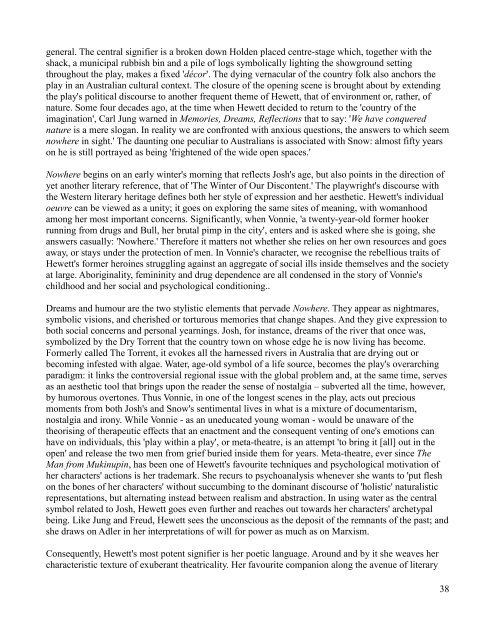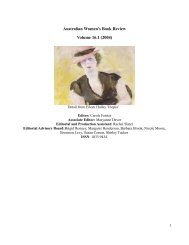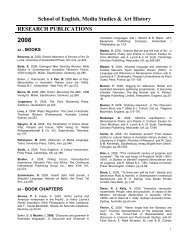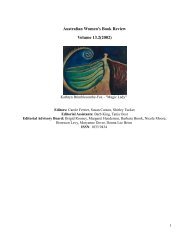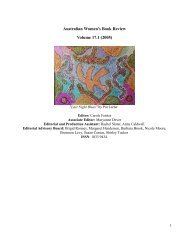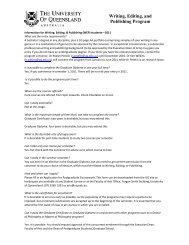Australian Women's Book Review Volume 14.1 - School of English ...
Australian Women's Book Review Volume 14.1 - School of English ...
Australian Women's Book Review Volume 14.1 - School of English ...
Create successful ePaper yourself
Turn your PDF publications into a flip-book with our unique Google optimized e-Paper software.
general. The central signifier is a broken down Holden placed centre-stage which, together with the<br />
shack, a municipal rubbish bin and a pile <strong>of</strong> logs symbolically lighting the showground setting<br />
throughout the play, makes a fixed 'décor'. The dying vernacular <strong>of</strong> the country folk also anchors the<br />
play in an <strong>Australian</strong> cultural context. The closure <strong>of</strong> the opening scene is brought about by extending<br />
the play's political discourse to another frequent theme <strong>of</strong> Hewett, that <strong>of</strong> environment or, rather, <strong>of</strong><br />
nature. Some four decades ago, at the time when Hewett decided to return to the 'country <strong>of</strong> the<br />
imagination', Carl Jung warned in Memories, Dreams, Reflections that to say: 'We have conquered<br />
nature is a mere slogan. In reality we are confronted with anxious questions, the answers to which seem<br />
nowhere in sight.' The daunting one peculiar to <strong>Australian</strong>s is associated with Snow: almost fifty years<br />
on he is still portrayed as being 'frightened <strong>of</strong> the wide open spaces.'<br />
Nowhere begins on an early winter's morning that reflects Josh's age, but also points in the direction <strong>of</strong><br />
yet another literary reference, that <strong>of</strong> 'The Winter <strong>of</strong> Our Discontent.' The playwright's discourse with<br />
the Western literary heritage defines both her style <strong>of</strong> expression and her aesthetic. Hewett's individual<br />
oeuvre can be viewed as a unity; it goes on exploring the same sites <strong>of</strong> meaning, with womanhood<br />
among her most important concerns. Significantly, when Vonnie, 'a twenty-year-old former hooker<br />
running from drugs and Bull, her brutal pimp in the city', enters and is asked where she is going, she<br />
answers casually: 'Nowhere.' Therefore it matters not whether she relies on her own resources and goes<br />
away, or stays under the protection <strong>of</strong> men. In Vonnie's character, we recognise the rebellious traits <strong>of</strong><br />
Hewett's former heroines struggling against an aggregate <strong>of</strong> social ills inside themselves and the society<br />
at large. Aboriginality, femininity and drug dependence are all condensed in the story <strong>of</strong> Vonnie's<br />
childhood and her social and psychological conditioning..<br />
Dreams and humour are the two stylistic elements that pervade Nowhere. They appear as nightmares,<br />
symbolic visions, and cherished or torturous memories that change shapes. And they give expression to<br />
both social concerns and personal yearnings. Josh, for instance, dreams <strong>of</strong> the river that once was,<br />
symbolized by the Dry Torrent that the country town on whose edge he is now living has become.<br />
Formerly called The Torrent, it evokes all the harnessed rivers in Australia that are drying out or<br />
becoming infested with algae. Water, age-old symbol <strong>of</strong> a life source, becomes the play's overarching<br />
paradigm: it links the controversial regional issue with the global problem and, at the same time, serves<br />
as an aesthetic tool that brings upon the reader the sense <strong>of</strong> nostalgia – subverted all the time, however,<br />
by humorous overtones. Thus Vonnie, in one <strong>of</strong> the longest scenes in the play, acts out precious<br />
moments from both Josh's and Snow's sentimental lives in what is a mixture <strong>of</strong> documentarism,<br />
nostalgia and irony. While Vonnie - as an uneducated young woman - would be unaware <strong>of</strong> the<br />
theorising <strong>of</strong> therapeutic effects that an enactment and the consequent venting <strong>of</strong> one's emotions can<br />
have on individuals, this 'play within a play', or meta-theatre, is an attempt 'to bring it [all] out in the<br />
open' and release the two men from grief buried inside them for years. Meta-theatre, ever since The<br />
Man from Mukinupin, has been one <strong>of</strong> Hewett's favourite techniques and psychological motivation <strong>of</strong><br />
her characters' actions is her trademark. She recurs to psychoanalysis whenever she wants to 'put flesh<br />
on the bones <strong>of</strong> her characters' without succumbing to the dominant discourse <strong>of</strong> 'holistic' naturalistic<br />
representations, but alternating instead between realism and abstraction. In using water as the central<br />
symbol related to Josh, Hewett goes even further and reaches out towards her characters' archetypal<br />
being. Like Jung and Freud, Hewett sees the unconscious as the deposit <strong>of</strong> the remnants <strong>of</strong> the past; and<br />
she draws on Adler in her interpretations <strong>of</strong> will for power as much as on Marxism.<br />
Consequently, Hewett's most potent signifier is her poetic language. Around and by it she weaves her<br />
characteristic texture <strong>of</strong> exuberant theatricality. Her favourite companion along the avenue <strong>of</strong> literary<br />
38


